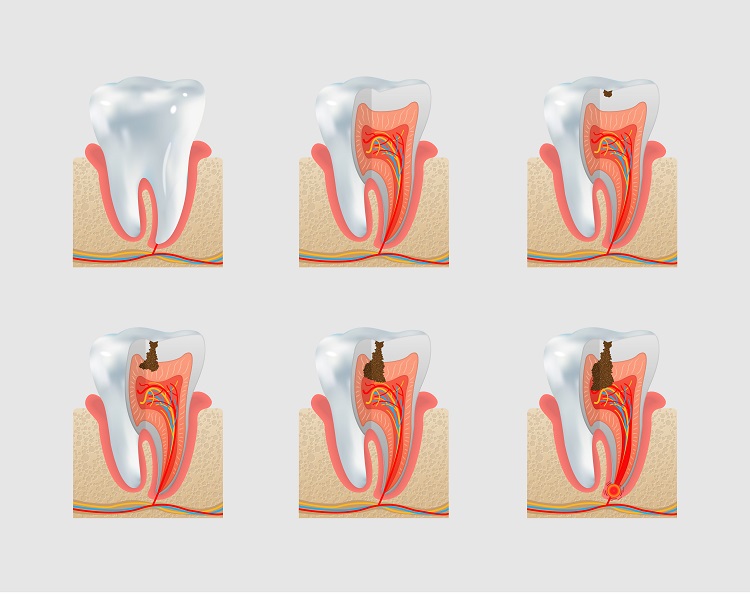Cavities: Symptoms, Diagnosis and treatment
Tooth decay is one of the most common health problems in the world. People of any age can get cavities.
If you have tooth decay, do not worry too much. Dentists always have many options to help you treat cavities promptly and prevent new tooth ones from developing.
Symptoms of cavities
Symptoms of tooth decay will depend on the severity of the condition and the location, including:
- Tooth sensitivity
- Toothache that occurs without any apparent cause
- Pain when biting down, eating and drinking something hot or cold
- Visible holes or pits in your teeth
- Brown, black or white staining on any surface of a tooth.
Causes of cavities
Tooth decay is caused by plaque on teeth. It is a combination of:
- Bacteria
- Saliva
- Acid
- Food debris
The human mouth is home to many species of bacteria. After eating or drinking sugary foods, the bacteria in your mouth will convert sugars into acids. Plaque will develop in your teeth as soon as you consume any sugary foods.
Therefore, brushing your teeth regularly, especially after eating is very important.
When plaque builds up on the teeth, the acid will gradually wear away the enamel - a thin and hard outer covering the tooth that protects it. When enamel weakens, the risk of tooth decay increases significantly.
Everyone is at risk for tooth decay, but some people are at higher risk:
- Eating/Drinking too much sugary or acidic foods and drinks
- Poor oral hygiene like not brushing or flossing regularly
- Not providing enough fluoride for the teeth
- Dry mouth that leads to a lack of saliva, not removing food debris and tooth plaques
- Age: cavities are common among children and adolescents or older people taking medication to reduce the volume of saliva, which increases the risk of tooth decay
- Eating disorders, such as anorexia or bulimia
- Gastroesophageal reflux disease causes stomach acid to move backward from the stomach to the esophagus and erode tooth enamel.
Cavities often develop easily in the back teeth due to the small grooves between these teeth that can collect food particles. In addition, these teeth are harder to keep clean using floss or a toothbrush.
Treatment options
If you have uncomfortable symptoms such as tooth sensitivity or pain, tell your dentist. Tooth decay can be identified after an oral exam, but there may be times when you need a dental X-ray to look for decay.
Depending on the severity of cavities, there are several treatments available.
Tooth fillings
Your dentist will use specialized dental tools to completely remove the cavities. They will then fill your tooth with a substance, such as silver, gold or composite resin.
Crowns
For more severe tooth decay, your dentist will use a crown to cover the damaged natural teeth. Before that, the decayed tooth material would be completely removed.
Root canal treatment
When tooth decay is severe and causes damage to the nerves inside the tooth, the dentist will perform a root canal to save your tooth. This process removes nerve tissue, blood vessels, and cavities.
Next, the dentist will check for infections and apply the medication to the root if necessary. Finally, the tooth is filled or covered with a crown.
Early-stage treatment
When the dentist detects tooth decay in its early stage, a fluoride treatment may help restore your tooth enamel and prevent further tooth decay.

Dealing with the pain
Tooth decay can be the cause of a lot of pain and discomfort.
If you want to find ways to ease the pain while waiting for your dentist appointment, try some of the following:
- Maintain your oral hygiene routine. Use a soft brush to clean all parts of your mouth, including any sensitive areas.
- Use over-the-counter (OTC) pain relievers.
- Watch what you eat and drink every day. Stay away from extremely hot or cold foods when eating or drinking.
Complications
Tooth decay can cause you many complications if not treated promptly, including:
- Persistent toothache
- Tooth abscess, which can cause life-threatening complications such as sepsis
- The development of pus around the infected tooth
- Increased risk of breaking or chipping a tooth
- Difficulty chewing food
These lesions may not be reversible if you don't go to the dentist for treatment. At that time, the only way to fix the tooth decay is to remove the tooth and replace it with an implant or bridge.
Preventions
You can reduce your risk of tooth decay by doing these simple habits:
- Brush your teeth at least twice per day with a fluoride toothpaste
- Use dental floss at least once a day to remove food debris
- Limit sugary and acidic foods like candy, juice, soda and refined carbohydrates
- Limit snacking between meals
- Check your fillings regularly.
Additionally, some foods that can help you fight against tooth decay are:
- Fiber-rich fruits and vegetables
- Calcium-rich foods
- Unsweetened green or black tea
- Water with fluoride
- Sugarless chewing gum.
Apart from that, don't forget to visit your dentist at least twice a year for regular dental checkups. This allows you to get treatment for any oral problems to prevent future dental problems.
A set of bright and healthy teeth makes a large contribution to a beautiful smile. So what to do to protect your oral health in the best way?
You and your family should have regular dental check-ups every 6 months to promptly detect oral diseases if any and choose the proper treatment.
Reference source
Services
Working Time
- Monday - Friday: 08:00 - 19:00
- Saturday: 08:00 - 18:00
- Sunday closed
Contact Info
- Hotline 1: (+84) 908 321 455
- Hotline 2: (+84) 931 857 885
- Mobile: (+84) 8 3925 8778
- Phone: (+84)2 838 258 778
- info@dentalrose.net
- rosedentalclinicvn@gmail.com
 English
English  Tiếng Việt
Tiếng Việt

